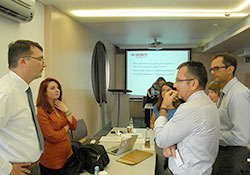Secretariat of WHO Framework Convention on Tobacco Control conducted joint needs assessment in Belarus

WHO
Upon invitation of the Ministry of Health of Belarus, the Secretariat of the WHO Framework Convention on Tobacco Control (WHO FCTC) conducted a joint needs assessment in Minsk, Belarus on 1–3 September 2015. It was carried out in collaboration with WHO/Europe, the United Nations Development Programme (UNDP) Regional Office in Istanbul (Turkey) and the Ministry of Health.
International experts organized a roundtable discussion with representatives of ministries and agencies involved in implementing the WHO FCTC. The experts were:
- Dr Tibor Szilagy, Convention Secretariat;
- Dr John Macauley, Regional HIV, Health and Development Specialist, UNDP Regional Hub, Istanbul, Turkey;
- Ms Lika Gamgebeli, International Consultant, Technical Support to Ensuring a Multi-Sectoral Approach to Addressing Non-Communicable Diseases and Health Inequalities in Eastern Europe and Central Asia, UNDP Regional Hub, Istanbul, Turkey; and
- Mr Andriy Skipalskyi, Chairman of the Board to Life Regional Advocacy Center, Kyiv, Ukraine.
Meetings also took place at the Ministry of Health, the National Assembly and the Ministry of Finance.
Progress acknowledged
During the meetings, progress in implementing the WHO FCTC in Belarus was acknowledged, in particular effective efforts to ban tobacco advertisement and recently approved regulation to remove cigarette packages from displays at the points of tobacco sales. However, further implementation of Article 8 "Protection from exposure to tobacco smoke" should be strengthened including the requirement for a complete ban on indoor smoking at restaurants, hotels and on long-distance trains.
The Convention Secretariat committed to support the Ministry of Health in adopting a new comprehensive law "Protection from exposure to tobacco smoke in Belarus" that the Ministry is preparing.
Next steps
A joint report with recommendations on implementing the WHO FCTC will be provided to the Ministry of Health by the end of 2015.



